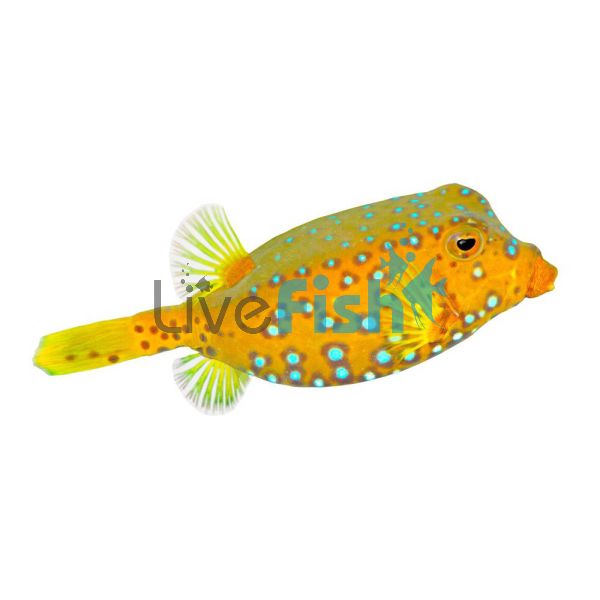Yellow Boxfish - Medium
The Yellow Boxfish is box-shaped and yellow with black/dark brown spots. One of its other common names from the Polka-dot Boxfish and young ones are just adorable.
As the Yellow Boxfish grows older the yellow colour fades to brown and the black spots become fewer and then a honeycomb pattern develops around the spots.
Large adults can be different coloured again as they become bluish in colour and have a yellow patch at the base of the tail. Blue on their fins, their body is then covered by the honeycomb pattern with small black dots at the centre of the honeycomb pattern.
These fish are classed as difficult to keep due to them being able to secrete a poison should it get injured or feel stressed which will kill the other fish in the tank, taking care of this fish otherwise isn’t especially difficult.
The Yellow Boxfish lives in the Indo-Pacific from East Africa to the Hawaiian and Tuamoto islands, north to Ryukyu Islands, south to Lord Howe Island. These boxfish inhabit lagoons and semi-sheltered seaward reefs.
Tank Recommendations for Yellow Boxfish
The Yellow Boxfish can grow fairly large at 18 inches (45 cm) and so it needs a tank that is at least of 473 lites (125 gallons).
It doesn’t have any particular requirements for water movement in the tank.
Juveniles do like rock crevices and corals to hide amongst. This isn’t needed for adults, these Boxfish are fine to keep in aquariums with live corals too.
Suitable Tank Buddies
There are a lot of fish which make good tankmates for the Yellow Boxfish.
Generally smaller or peaceful fish that’s will leave the Boxfish alone and not harass are usually the best options to ensure that there are no issues.
Usually Compatible
Yellow Boxfish mix well with a variety of other species such as Dwarf Angelfish, Anglerfish, Anthias, Blennies. Butterflyfish, Cardinalfish, Clownfish, Damselfish, Dragonettes, Gobies, Lionfish, Tangs and Wrasses also mix well.
Sometime Compatible
Be careful if mixing these Boxfish with other Boxfish or Pufferfish as these will compete for the same food resources.
They may also eat crustaceans and invertebrates in the tank. Eels, large Angelfish, Groupers, Snappers and Triggerfish can also cause problems when kept with Boxfish.
If they cause the Boxfish to start feeling stressed then it will release a poisonous substance, called ostracitoxin, from its mucous glands which will kill all the fish in the tank very, including the Boxfish.
Rarely Compatible
Sharks aren’t compatible to keep with the Yellow Boxfish as they are likely to make the Boxfish feel stressed.
Which would likely lead them to release their ostracitoxin and kill the other tankmates.
Feeding Your Yellow Boxfish
The natural diet of this boxfish is algae supplemented with microorganisms, invertebrates, molluscs, sponges , crustaceans and small fishes.
In Aquariums they like to eat meaty foods as well as plant based foods. They will eat both live and frozen including squid, shrimp, worms, clams, fish and various mussels, cleaned and chopped up. They will also eat snails and tunicates, so feeding them a varied diet in the aquarium isn’t difficult, they’ll even take the occasional algae wafer.
Several small meals a few times a day is the best way to feed them.
You should also feed juvenile Boxfish several times a day. It’s best to start with brine shrimp when they are small and then work up to larger foods as they get bigger.
| Scientific Name | Ostracion cubicus |
|---|---|
| Care Level | Hard |
| Common Names | Polka-dot Boxfish, Yellow Boxfish and Blue-spotted Boxfish, Box Fish, Boxy, Cubed Boxfish, Ocellated Boxfish and Yellow Trunkfish |
| Diet | Omnivore |
| Fish Family | Ostraciidae |
| Lifespan (years) | 4 |
| Max. Length (cm) | 45 |
| Min. Tank Volume (l) | 473 |
| Origin | Indo-Pacific |
| Reef Safe | With Caution |
| Sociability | Semi-aggressive |
| Venomous | Yes |
| Water Conditions | 22.2-25.6° C (72-78° F), dKH 8-12, pH 8.1-8.4, sg 1.020-1.025 |




